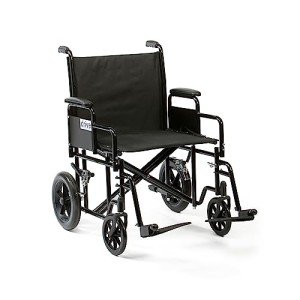Bariatric Folding Wheelchair

Bariatric folding wheelchairs are created to accommodate users of a larger size. They feature a greater weight capacity than basic models and are developed with enhanced products for added stability and durability.
However, not everyone with a high body mass index (BMI) requires a bariatric chair as numerous fall within the safe weight limits of standard wheelchairs.
Size and Weight Capacity
Bariatric wheelchairs have broader seats and are developed to accommodate bigger people, typically weighing up to 500 pounds. These chairs have a heavy-duty frame made from reinforced products like steel and are developed with larger wheels that offer more weight circulation and maneuverability for bigger users.
When comparing bariatric wheelchairs, make sure the weight capacity is listed as static or active load. Static weight capacity describes how much a chair can hold when it's sitting still, while active load capacity is figured out by putting the chair through a drop test that simulates someone plopping down into the seat.
Standard wheelchairs are widely produced and designed for users with average body weights, making them more affordable than bariatric models. Medicare and other insurance coverages might only cover a minimal number of bariatric wheelchairs, depending upon a client's medical needs and medical diagnosis. These chairs are likewise more expensive than standard wheelchairs because they have a customized design and construction. However, they are a great service for patients with a vast array of medical conditions that require a more comfy travel experience.
bariatric wheelchair 400 lb capacity and Comfort
Unlike standard wheelchairs, bariatric models have larger seats to accommodate bigger individuals. They also have more robust frames and big, durable wheels that can withstand greater loads. They can be tailored with various seating choices and devices based on the user's needs and choices.
When comparing wheelchairs, it's important to take a look at their weight capabilities under both fixed and active load scores. Static load describes the chair's maximum capacity when it's sitting still, while active load steps just how much a wheelchair can securely hold when someone beings in it and moves around. Some producers might also display the weight limit of a bariatric wheelchair in kilograms, which is frequently more precise because it takes into account the average bodyweight of a person who uses the chair.
In addition to a wide seat, a bariatric folding wheelchair needs to have adjustable padded leg rests to help users remain comfy while traveling. It should also have turn up armrests that can be moved out of the way to avoid getting in the user's way when they desire to stand up or transfer to another surface.
If you're considering a bariatric wheelchair, ask a doctor or mobility professional for recommendations. They can assess your needs, advise the ideal chairs for you, and guide you through the procedure of purchasing one. They can likewise assist you compare functions and prices to discover a wheelchair that finest fits your budget. They can even offer suggestions on other mobility solutions such as power placing systems and iLevel seating.
Weight and Portability
While basic wheelchairs are generally economical, bariatric chairs tend to be a bit more costly. This is because of their specialized style and construction, as well as the truth that they're a little heavier than their counterparts.
If you're concerned about the cost of a bariatric chair, speak to a doctor or mobility specialist. They'll have the ability to assess your special needs and determine which kind of wheelchair is the finest fit for you. They can also advise wheelchair accessories based upon your specific requirements. In addition, if you're aiming to get your wheelchair covered by insurance coverage, such as Medi-Cal, they can guide you on the steps included in this procedure. To find out more, read our guide to wheelchair insurance coverage. Then, you can begin your journey towards independent mobility.
Manoeuvrability and Handling
Choosing the ideal wheelchair can be an important choice for those with minimal mobility. Bariatric wheelchairs use increased weight capabilities and are developed to accommodate bigger people. They normally include bigger wheels, larger armrests and seating choices, and are tougher than standard wheelchairs.
When selecting a bariatric wheelchair, think about the person's particular requirements and the environment in which they will be utilizing it. Assess the weight capacity and seat measurements, and try to find adjustable features like cushioned elevating leg rests to support convenience and ease of transfer.
Identify whether the wheelchair appropriates for manual or powered use. For added versatility, a bariatric folding wheelchair can be easily folded and compacted for storage or transport. This makes them an ideal choice for those with restricted home space or who require to travel fars away. The wheelchairs likewise feature puncture evidence wheels to ensure resilience and low maintenance. Appropriate for users as much as a maximum of 35 stone.
